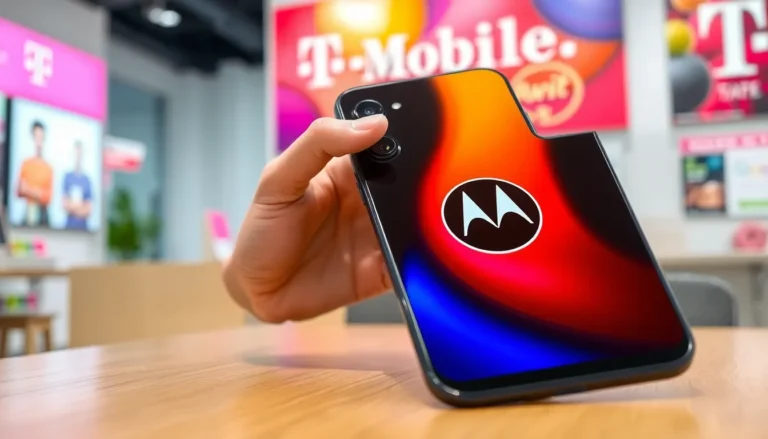In a world where smartphones have become an extension of ourselves, mobile brand marketing is the secret sauce that can make or break a business. Imagine your brand popping up on someone’s screen just when they’re craving a late-night snack or planning their next adventure. That’s the magic of mobile marketing—it’s like having a personal assistant who knows exactly what your customers want (and when they want it).
Table of Contents
ToggleOverview of Mobile Brand Marketing
Mobile brand marketing focuses on engaging customers through mobile devices. Brands leverage this approach to build relationships, increase visibility, and drive sales. Digital platforms like social media, apps, and SMS marketing serve as key channels for communication.
Today, nearly 80% of internet users access the web via their smartphones. This shift makes mobile a crucial component of any marketing strategy. Marketers harness location-based services for targeting, allowing brands to reach customers with relevant offers based on their physical location.
Innovative tactics, such as in-app advertisements and push notifications, enhance brand visibility and engagement. Interactive content, such as polls and quizzes, captures user interest and fosters connections. Mobile-friendly websites ensure a seamless experience, increasing the likelihood of conversion.
Data drives effective mobile brand marketing. Analytics provide insights into customer behavior and preferences. Marketers can tailor campaigns based on this data, ensuring personalized experiences that resonate with users.
In addition, video marketing plays a significant role in mobile strategies. Engaging short videos capture attention and encourage sharing across social platforms. Brands using videos effectively report higher engagement rates and improved brand recall.
Investing in mobile optimization boosts a brand’s performance. Fast load times, user-friendly interfaces, and accessible content keep customers engaged. Brands that prioritize mobile experiences stand a better chance of retaining customers in this competitive landscape.
Mobile brand marketing continues to evolve, adapting to technology trends and consumer preferences. Staying current with industry developments ensures effective strategies that can meet changing customer expectations.
Importance of Mobile Brand Marketing
Mobile brand marketing plays a crucial role in engaging customers and driving business success in today’s digital landscape.
Consumer Behavior Trends
Mobile usage shapes consumer behavior significantly. Data shows about 80% of internet users rely primarily on smartphones for web access. This trend alters how brands communicate, necessitating tailored content that resonates with mobile users. Moreover, consumers prioritize convenience and instant access. Brands that leverage location-based services can deliver targeted offers, enhancing the likelihood of conversions. Interactive content, such as polls and quizzes, fosters stronger connections with audiences. Personalization emerges as a vital aspect of modern marketing strategies, ensuring content aligns with individual preferences.
Impact of Mobile Usage
The rise in mobile usage greatly influences marketing strategies. Mobile devices facilitate real-time engagement, allowing brands to connect efficiently with customers. Short video content becomes increasingly popular, driving higher engagement rates. Engaging videos can boost brand recall, ensuring messaging sticks with audiences. Brands focusing on mobile optimization see improved performance, thanks to fast load times and user-friendly interfaces. Consumer expectations continue to evolve with technological advancements, highlighting the importance of adapting marketing efforts. Businesses that stay current with these trends maintain a competitive edge by meeting customers where they are.
Strategies for Effective Mobile Brand Marketing
Effective mobile brand marketing hinges on specific strategies that resonate with users. Brands must engage customers through tailored approaches.
Mobile-Friendly Content
Mobile-friendly content enhances user experience and boosts engagement. Layouts must be responsive and easy to navigate on smartphones. Short paragraphs and concise messages grab attention quickly. Visual elements, such as images and videos, enrich the narrative while breaking up text. Furthermore, incorporating CTAs encourages interactions. Statistics show that 75% of users prefer content optimized for their devices, demonstrating the necessity for brands to focus on mobile-first strategies.
Social Media Integration
Social media integration plays a critical role in connecting brands with mobile users. Platforms like Instagram and Facebook offer unique advertising opportunities that capitalize on mobile usage. Posting regularly on these channels amplifies brand visibility. Engaging with followers through comments and messages builds loyalty and community. Additionally, leveraging user-generated content fosters authenticity, as consumers respond well to real experiences. Reports reveal that 54% of people use social media to research products, making it imperative for brands to establish robust social media presences.
Challenges in Mobile Brand Marketing
Mobile brand marketing faces several challenges that can impact effectiveness. Addressing these hurdles is key to achieving marketing success.
Privacy Concerns
Privacy concerns present significant obstacles for brands. Users increasingly prioritize their personal data security, leading to hesitance in sharing information. Approximately 79% of consumers express discomfort with how brands utilize their data. Consequently, brands must balance personalized marketing approaches with transparency. Implementing clear privacy policies can enhance trust. With growing regulations, such as the GDPR, businesses must also ensure compliance to avoid legal repercussions.
Competition in the Market
Competition in the mobile marketing landscape intensifies daily. Brands contend with numerous competitors vying for consumer attention. As 90% of businesses invest in mobile marketing strategies, differentiation becomes vital. Innovative approaches, such as leveraging augmented reality and influencer partnerships, can set brands apart. Focusing on unique value propositions can capture interest. In a saturated market, maintaining visibility requires continuous adaptation to emerging trends and consumer preferences.
Future Trends in Mobile Brand Marketing
Emerging trends in mobile brand marketing highlight the integration of advanced technologies. Augmented reality (AR) enhances user engagement, offering immersive experiences that captivate audiences. Voice search optimization grows in importance as more consumers use voice assistants for product inquiries. Chatbots deliver real-time customer service, allowing brands to respond instantly to inquiries and improve satisfaction rates. Artificial intelligence (AI) also plays a vital role in analyzing customer behavior, providing better-targeted marketing efforts that match individual preferences.
Personalization and user experience define the future of mobile marketing strategies. Tailored content increases engagement, as 75% of users prefer device-optimized experiences. Brands increasingly leverage data analytics to create individualized offers that resonate with consumers. Optimizing mobile interfaces ensures seamless navigation, leading to higher conversion rates. Additionally, brands are investing in relevant content that aligns with consumer interests, significantly enhancing interaction and retention. Interactive elements further enrich user experiences, fostering deeper connections between brands and consumers.
Mobile brand marketing is no longer an option; it’s a necessity. As consumer behavior shifts towards mobile-first interactions brands must embrace innovative strategies to stand out in a crowded marketplace. By leveraging technology and data analytics businesses can create personalized experiences that resonate with their audience.
Investing in mobile optimization and engaging content is paramount for enhancing user experience and driving conversions. The future of mobile marketing lies in adaptability and creativity. Brands that stay ahead of trends and prioritize customer needs will not only survive but thrive in this dynamic environment. Embracing these changes will ensure lasting connections and sustained growth in an ever-evolving digital landscape.




